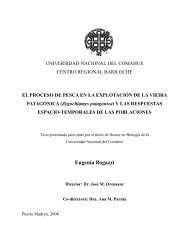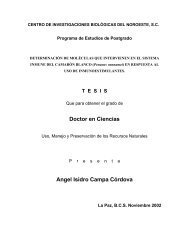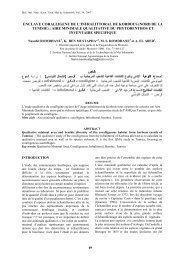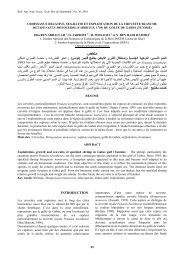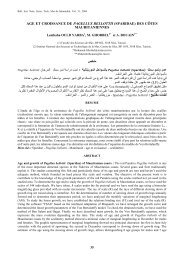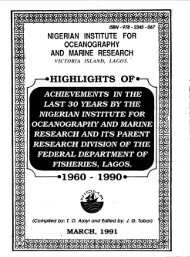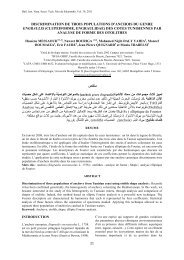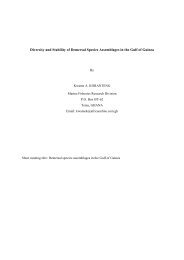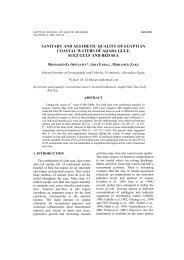Coastal vulnerability, resilience and adaptation to ... - OceanDocs
Coastal vulnerability, resilience and adaptation to ... - OceanDocs
Coastal vulnerability, resilience and adaptation to ... - OceanDocs
Create successful ePaper yourself
Turn your PDF publications into a flip-book with our unique Google optimized e-Paper software.
implement decisions on the mix of uses that best serves the needs of society now <strong>and</strong> in the<br />
future.<br />
Integrated coastal zone management (ICZM) has been widely recognised <strong>and</strong> promoted as<br />
the most appropriate process <strong>to</strong> deal with these current <strong>and</strong> long-term coastal challenges. According<br />
<strong>to</strong> WCC’93 (1994), Ehler et al. (1997) <strong>and</strong> Cicin-Sain <strong>and</strong> Knecht (1998), ICZM provides<br />
coastal societies with an opportunity <strong>to</strong> move <strong>to</strong>wards sustainable development. Integrated<br />
management of conflicting uses <strong>and</strong> activities is essential for this goal. Moreover, ICZM allows<br />
current <strong>and</strong> future interests in coastal areas <strong>and</strong> resources <strong>to</strong> be taken in<strong>to</strong> account. By considering<br />
short, medium <strong>and</strong> long-term interests, ICZM stimulates economic development of<br />
coastal areas <strong>and</strong> resources, whilst reducing the degradation of their natural systems. Third,<br />
ICZM provides a framework within which flexible responses can be developed <strong>to</strong> deal with the<br />
inherent uncertainty about the future, including rates <strong>and</strong> magnitude of climate change. In<br />
short, ICZM can provide coastal states with a process <strong>to</strong> enhance economic development <strong>and</strong><br />
improve the quality of life (WCC’93, 1994).<br />
At the World Coast Conference, ICZM was defined as follows:<br />
Integrated coastal zone management involves the comprehensive assessment, setting of objectives, planning<br />
<strong>and</strong> management of coastal systems <strong>and</strong> resources, taking in<strong>to</strong> account traditional, cultural <strong>and</strong> his<strong>to</strong>rical<br />
perspectives <strong>and</strong> conflicting interests <strong>and</strong> uses; it is a continuous <strong>and</strong> evolutionary process for<br />
achieving sustainable development.<br />
The purpose of ICZM is <strong>to</strong> provide the conditions that will facilitate development, stimulate<br />
progress <strong>and</strong> encourage (changes in) human <strong>and</strong> institutional behaviour in order <strong>to</strong><br />
achieve shared goals. In general, these goals are specified targets related <strong>to</strong> the desired mix<br />
of goods, services <strong>and</strong> values <strong>to</strong> be produced, consumed or conserved. ICZM must anticipate<br />
<strong>and</strong> respond <strong>to</strong> the needs of coastal communities; public participation <strong>and</strong> stakeholder involvement<br />
in the planning <strong>and</strong> implementation of ICZM are therefore essential.<br />
To be successful, ICZM should include the following (Bijlsma et al., 1996):<br />
Integration of programmes <strong>and</strong> plans for economic development, environmental management<br />
<strong>and</strong> l<strong>and</strong> use;<br />
Integration of programmes for economic sec<strong>to</strong>rs, such as agriculture, fisheries, energy,<br />
transportation, water resources, waste disposal <strong>and</strong> <strong>to</strong>urism;<br />
Integration of responsibilities for various tasks of management amongst levels of government<br />
(local, state/provincial, national <strong>and</strong> regional), as well as between the public <strong>and</strong><br />
private sec<strong>to</strong>r;<br />
Integration of available resources for management (personnel, funds, materials <strong>and</strong><br />
equipment);<br />
Integration amongst scientific disciplines, such as ecology, geomorphology, hydrology,<br />
economics, engineering, political science, behavioural science <strong>and</strong> law.<br />
Although integration in management requires more extensive analysis, preparation <strong>and</strong><br />
planning than is common in sec<strong>to</strong>ral management, the overall costs of ICZM can ultimately be<br />
lower than the cumulative costs of separate sec<strong>to</strong>ral approaches. In addition, taking a proactive,<br />
or precautionary, approach <strong>to</strong> ICZM (i.e., acting before irreversible damage is realised)<br />
can provide not only environmental but also economic benefits (Vellinga <strong>and</strong> Leatherman,<br />
1989; Tol et al., 1995).<br />
This chapter has shown that <strong>adaptation</strong> <strong>to</strong> climate change cannot be separated from the<br />
planning <strong>and</strong> management efforts <strong>to</strong> address present-day problems in coastal areas. Carefully<br />
harmonising the different sec<strong>to</strong>ral development options <strong>and</strong> needs is a first step in an evolutionary<br />
process <strong>to</strong>wards sustainable development in coastal zones. Sustainable development<br />
has, by definition, an extended time horizon. Long-term thinking, as encouraged by the consideration<br />
of climate change, is therefore a key component of ICZM <strong>and</strong> can be economically<br />
feasible (Tol et al., 1995).<br />
However, it is important <strong>to</strong> note that there is no single recipe for successful ICZM. Every<br />
coastal zone faces different challenges, which require unique approaches <strong>to</strong> management.<br />
Whereas one can identify basic steps in ICZM (problem recognition, analysis <strong>and</strong> planning, implementation<br />
of measures, operation <strong>and</strong> maintenance <strong>and</strong> moni<strong>to</strong>ring <strong>and</strong> evaluation of the<br />
effectiveness of the measures), the most appropriate management approach will depend <strong>to</strong> a<br />
21






